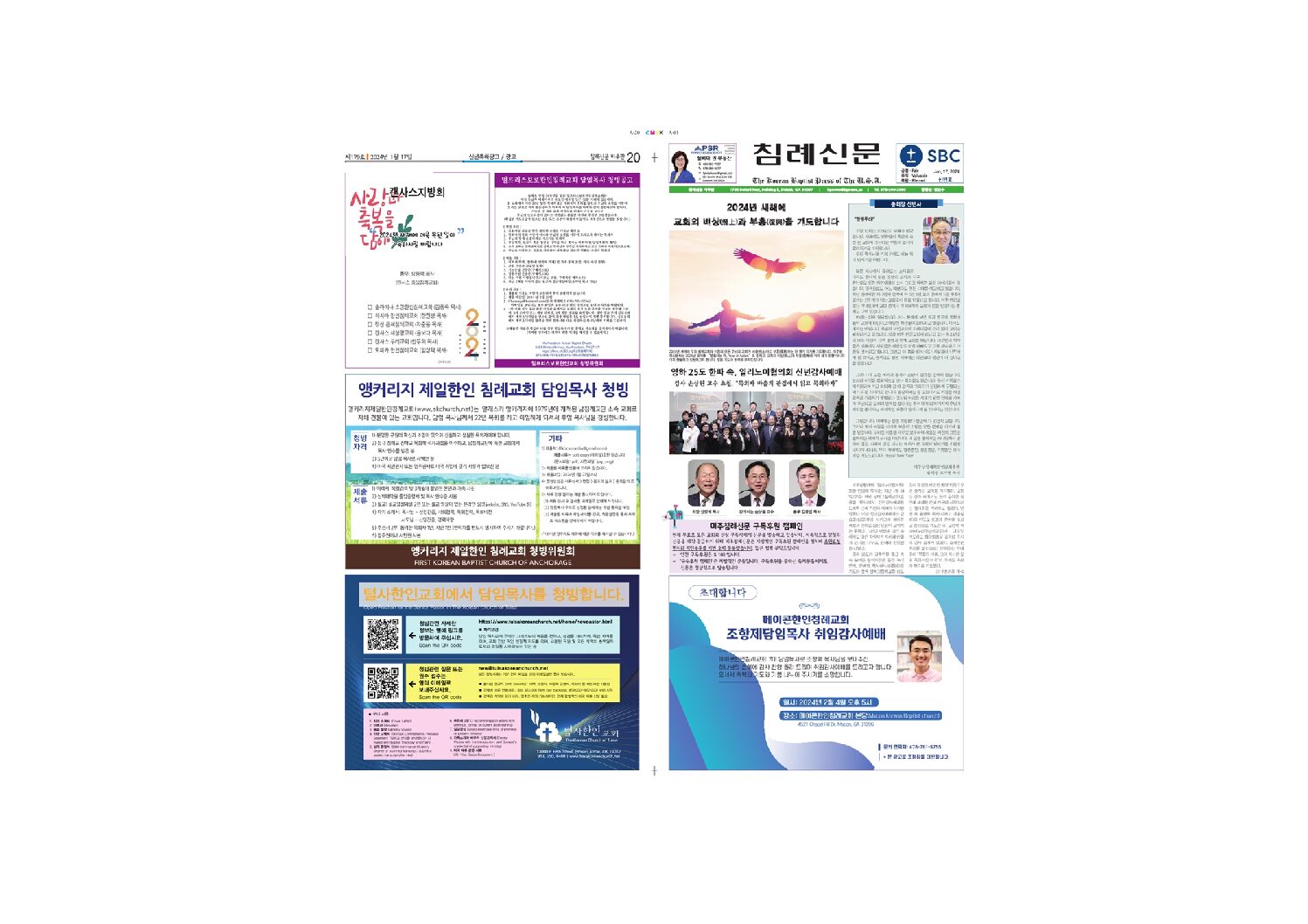![[특집] 저자 인터뷰 – ‘목회트렌드 2024’ 박종순 목사](https://i0.wp.com/bpnews.us/wp-content/uploads/2024/04/web-IMG_6176.jpg?resize=150%2C150&ssl=1)
[시론 時論] 우크라이나 전쟁과 기독교인의 자세

이사무엘 박사 / SBC 연방군종 교구장
우크라이나 전쟁과 기독교인의 자세
우크라이나-러시아 분쟁의 현 상황을 이해하고 지정학적 갈등에 처한 국민에 대한 적절한 선교적 사고방식을 갖기 위해서는 현재의 분쟁으로 확대된 과거의 역사적 사건을 면밀히 살펴봐야 합니다.
2013년 11월 21일, 빅토르 야누코비치 전 우크라이나 대통령은 갑자기 우크라이나-유럽연합(EU) 협정 이행을 포기하고 EU와의 긴밀한 관계 대신 러시아로 눈을 돌렸습니다. 그의 결정은 우크라이나에서 대규모 시위를 불러일으켰고 야누코비치의 축출로 이어졌으며, 급기야는 2014년 3월 18일 러시아군이 크림반도와 우크라이나 동부, 도네츠크, 루한스크를 합병하게 되는 우크라이나 정부와 러시아 특수부대의 지원을 받는 친러시아 반군 간의 전쟁으로 치솟았습니다.
우크라이나는 러시아와 매우 가깝지만 불편한 관계를 공유하고 있습니다. 우크라이나의 수도 키이우(또는 키예프)는 한때 러시아와 우크라이나 국가의 전신이며 강대국이었던 키예프 루스에서 루스 도시들의 어머니로 불렸다. 그러나 우크라이나는 소외되고 열악한 대우를 받았으며(예로 1932~33년의 홀로도모르 기아 사건) 러시아의 에너지(가스 75%, 석유 80%)에 크게 의존했습니다. 이웃 국가로서 러시아는 우크라이나와 서방 국가, 특히 유럽연합과의 동맹에 큰 관심을 갖고 있으며 러시아의 이익을 보호하기 위해 모든 수단을 동원할 의향이 있다는 것입니다.
우크라이나가 NATO 가입에 가까워짐에 따라 하르키우 협정을 이행하여 크림반도 문제를 해결하기 위해 누군가 우크라이나와 러시아 사이를 중재해야 합니다. 러시아는 크림반도를 포기하지 않을 것이며, 우크라이나도 자국 영토를 포기할 수 없습니다. 유일한 타협은 우크라이나의 적법성과 크림반도에서의 경제적 이익을 얻는 동시에 우크라이나에 흑해 함대를 보유하려는 러시아의 욕구를 충족시키는 것입니다. 이는 하르키우 협정(2017년까지 임대 계약)을 수정하고 2020년 이후 계약을 후속 조치하는 것을 의미합니다. 또한, NATO는 우크라이나를 포함한 동유럽의 경제 발전을 위한 파트너십을 형성하도록 러시아를 초대해야 합니다. 이는 NATO가 지역 전략 파트너로서 일련의 책임을 부과하는 동시에 러시아의 권리를 인정한다는 메시지가 될 것입니다.
그러하다면, 이러한 지정학적 상황에서 기독교인들은 어떤 교훈으로 선교에 임해야 할까요? 첫째, 우리는 민족주의적 신앙이 갖는 위험성을 이해해야 합니다. 러시아정교회(ROC)는 푸틴 대통령의 열렬한 지지자였으며 러시아 정부의 보호와 종교 독점을 누려왔습니다. 푸틴 대통령의 70번째 생일 축하 행사에서 러시아정교 수장인 키릴 총대주교는 공개적으로 “하나님이 당신을 우리의 인도자로써 권력을 주셨습니다”라고 말했습니다. 러시아정교는 또한 전쟁 노력을 지원하고 현장에서 군인을 이끄는 장군들을 공개적으로 축복했습니다. 우크라이나 침공은 러시아에게 상상하지 못했던 결과를 초래했고, 러시아정교와 긴밀하게 협조했던 우크라이나 정교회(UOC)의 몰락을 초래했습니다. 우크라이나 정치인들은 우크라이나 정교회를 금지하는 것을 고려하고 있습니다. 200개 이상의 본당이 있는 우크라이나 정교회는 전쟁 이후 교단 이탈을 시행했으며 많은 교회들이 소속을 변경했습니다. 현재는 우크라이나인의 4%만이 모스크바 관련된 교회에 속해 있습니다. 그리스도 안에서 자신의 정체성과 순종할 수 있는 궁극적인 권위를 아는 것은 기독교인에 대한 세속적 영향력의 침입과 정치적 기관에 대한 무분별한 충성을 막을 것입니다.
둘째, 전쟁의 악은 신앙의 발흥을 꺾을 수 없습니다. 좋은 예는 전쟁으로 피폐해진 우크라이나의 기독교 인구 증가입니다. 성직자에 대한 우크라이나인의 신뢰도는 낮아, 미국의 34%에 비해 성직자가 도덕적이고 영적인 존재라고 믿는 비율은 23%에 불과합니다. 그러나 2022년에는 74%가 자신을 기독교 신자라고 밝혔으며, 이는 2021년 67.8%에서 증가한 수치입니다.
초기 그리스도인들은 박해를 받았을 때 장애물을 극복하고 예상치 못한 결과를 가져오는 하나님의 능력을 경험했습니다. 베드로와 요한은 체포되어 위협을 받았지만, 제자들은 흔들리지 않고 “모두 성령이 충만하여 담대히 하나님의 말씀을 전”했습니다(행 4:31). 고통은 종종 신자들 사이에서 삶의 의미를 찾고 더 심오한 종교적 경험을 찾는 데 도움이 됩니다. 우크라이나인들이 희망에 마음을 열고 러시아인들이 교회의 참된 의미에 마음을 열 때, 복음주의 그리스도인들은 그들의 공허함을 그리스도의 복음으로 채우기 위해 행동해야 합니다. 적절한 시기는 오래 가지 않을 것이고, 거짓 복음은 자신들의 거점을 만들기 위해 열심히 공허 속으로 들어갈 것입니다.
셋째, 우크라이나 전쟁은 미국이나 한국과는 거리가 먼 것 같지만, 하지만 우리는 더 이상 거리가 고립의 요인이 되지 않는 사회에 살고 있기에 유럽의 지정학적 문제가 우리의 사회에 여러 면으로(경제, 정치,국방) 영향을 미칩니다. 기독교인의 선교가 브라질과 인도네시아의 정글에 영향을 끼칩니다. 그러기에 러시아인과 우크라이나인들은 기독교인들의 행동, 선교의 방향이나 혹은 활동 부족을 지켜보고 있습니다. 이런 시기에 남침례교인들은 그들의 정치적 입장에 관계없이 선교에 확고한 헌신을 약속해야 하며, 지역의 평화를 옹호해야 합니다. 기도는 절대적으로 필요하며, 우리 선교사들을 인적, 물질적 지원으로 지원하는 것이 매우 중요합니다. 무엇보다도 평화 과정에는 일시적인 관심 외에도 장기적인 인내심이 필요할 것입니다.
War and Mission
To understand the current situation in the Ukraine-Russia conflict and have an appropriate ministry mindset for the people in geopolitical conflicts, we must closely look at the past historical events that escalated into the current conflict.
On 21 November 2013, the Former president of Ukraine, Viktor Yanukovych, suddenly abandoned the implementation of the Ukraine-European Union (EU) Association agreement and turned to Russia instead of closer ties with the EU. His decision caused mass protests in Ukraine and resulted in the ousting of Yanukovych. The Russian military annexed Crimea on 18 March 2014, and the eastern part of Ukraine, Donetsk, and Luhansk, into a war between the Ukrainian government and pro-Russian insurgents supported by the Russian special forces.
Ukraine shares a very close yet uneasy relationship with Russia. Kiel, Ukraine’s capital, is called a Mother of Russian Cities, which once powerful Kievan Rus state, a predecessor of Russian and Ukrainian nations. However, Ukraine was marginalized and treated poorly (i.e., Holodomor in 1932-33)1 and heavily depended on Russia’s energy (75% of gas and 80% of oil). As a neighboring state, Russia is keenly interested in Ukraine’s alliance with the Western countries, especially the European Union, and is willing to exercise all means to protect Russia’s interests.
As Ukraine is getting closer to being a part of NATO, someone has to mediate between Ukraine and Russia to resolve the Crimea issue by fulfilling the Kharkiv Accords2. Russia will not give up on Crimea, and Ukraine cannot give up on its territory. The only compromise is to gain Ukraine’s legitimacy as well as economic gain in Crimea while satisfying Russia’s desire to have the Black Sea Fleet in Ukraine, which means to rectify the Kharkiv Accord (lease agreement until 2017) and follow-on the agreement beyond 2020. Additionally, NATO must invite Russia to form a partnership in economic development in Eastern Europe, including Ukraine. It will send a message that NATO recognizes Russia’s rights while imposing a set of responsibilities as a regional strategic partner.
How did this geo-political situation affect the Christians and the Great Commission?
First, we must understand the danger of being a nationalistic faith. Russian Orthodox Church (ROC) has been a staunch supporter of Putin and enjoyed the government’s protection and monopoly of religion in Russia. In Putin’s 70th birthday celebration, Patriarch Kirill, the head of the ROC, told publicly that “God put you (Putin) in power so that you could perform a service of special importance and of great responsibility for the fate of the country and the people entrusted to your care.”3 ROC also supported the war effort and “publicly blessing the generals leading soldiers in the field.”4 Invasion of Ukraine caused consequences that Russia did not count: the fall of the Ukrainian Orthodox Church (UOC). UOC was closely tied to ROC and utilized as a political tool of Russia. However, Ukrainian politicians are considering banning the UOC due to the war. Many UOC, over 200 parishes, have changed their affiliation since the war, and only 4% of Ukrainians identify themselves with Moscow-related churches.5 Knowing one’s identity in Christ and ultimate authority to obey will deter the invasion of secular influence on Christians and unquestioning loyalty to the political establishment.
Second, the evil of war cannot demise the rise of faith. A good example is the increase of the Christian population in the war-torn Ukraine. While Ukrainians’ trust in the clergy is low, only 23% believe that clergy are deeply moral and spiritual compared to 34% in the USA; 74% identified themselves as believers in 2022, which is an increase from 67.8% in 2021.46
When early Christians experienced persecution, they experienced the power of God to overcome obstacles and cause unexpected results. Peter and John were arrested and threatened, yet the disciples were unshaken but “all filled with the Holy Spirit and began to speak the word of God with confidence” (Acts 4:31). The suffering often helps to seek the meaning of life and more profound religious experience among the believers. As Ukrainians open their heart to hope and Russians to the true meaning of the Church, evangelical Christians must act to fill their void with the Gospel of Christ. The opportune time would not last long nor discriminate the religions. The false gospel would eagerly step into the void to make their home.
Third, the war in Ukraine seems a long way from home. However, we live in a society where distance is no longer a factor for isolation. Geopolitics in Europe does affect socioeconomics in America. The actions of Christians in the USA will influence the jungles of Brazil and Indonesia. Of course, Russians and Ukrainians are watching our actions or lack of activities. In times like this, Southern Baptists must make a solid commitment to the missions, regardless of their political stands, and advocate peace in the region. Prayer is absolutely necessary, and supporting our missionaries with personnel and material support is critical. By the way, the peace process may necessitate patience.




![[특집] 2024 미주한인침례교 선교대회 성료](https://i0.wp.com/bpnews.us/wp-content/uploads/2024/03/web-IMG_0865.jpg?resize=150%2C150&ssl=1)


![[특집] ‘쉼, 충전, 회복’ 2024 목회부 수양회 성료](https://i0.wp.com/bpnews.us/wp-content/uploads/2024/04/메인-단체사진-scaled.jpg?resize=440%2C264&ssl=1)

![[부고 訃告 ] 총회 상임총무 강승수 목사 빙모상](https://i0.wp.com/bpnews.us/wp-content/uploads/2024/03/001.jpg?resize=150%2C150&ssl=1)





![[신간 소개] 강태광 목사 『손에 잡히는 크리스천 행복론』](https://i0.wp.com/bpnews.us/wp-content/uploads/2024/04/9791196615482.jpg?resize=440%2C264&ssl=1)



![[박인화 목사의 하.나.우 이야기 (34)] “받고 발산!”](https://i0.wp.com/bpnews.us/wp-content/uploads/2020/08/박인화-목사님-web.png?resize=440%2C264&ssl=1)

 “105세 보다는 젊지 않은가!!!!!”](https://i0.wp.com/bpnews.us/wp-content/uploads/2020/08/궁인-목사님-web.png?resize=150%2C150&ssl=1)
![[목회단상 牧會斷想] 돈에 팔려간 목사](https://i0.wp.com/bpnews.us/wp-content/uploads/2023/01/지준호-목사님.gif?resize=150%2C150&ssl=1)
![[이수관 목사의 목회의 길에서] “내 위기가 왔습니다”](https://i0.wp.com/bpnews.us/wp-content/uploads/2020/08/이수관-목사님-web.png?resize=150%2C150&ssl=1)
![에스더 사모의 [진리와 하나된 교육] – 9 “Do you believe in Jesus?”](https://i0.wp.com/bpnews.us/wp-content/uploads/2023/08/박민희-사모.jpg?resize=440%2C264&ssl=1)

![에스더 사모의 [진리와 하나된 교육] – 8 “부활 신앙을 가르치라”](https://i0.wp.com/bpnews.us/wp-content/uploads/2023/08/박민희-사모.jpg?resize=150%2C150&ssl=1)


![[강태광 목사의 문학의 숲에서 만나는 진리의 오솔길] 기독교 문학 산책 – C. S. 루이스의 생애 산책(13)](https://i0.wp.com/bpnews.us/wp-content/uploads/2020/08/강태광-web.png?resize=440%2C264&ssl=1)

![[김웅의 성경만화] 기타 치는 세 집사: 다윗 편](https://i0.wp.com/bpnews.us/wp-content/uploads/2023/12/김웅-목사님-scaled.jpg?resize=150%2C150&ssl=1)





![[시론 時論] 종교의 자유](https://i0.wp.com/bpnews.us/wp-content/uploads/2023/09/온라인도-변경-Dr-Sam-Lee.jpg?resize=388%2C264&ssl=1)
![[사설 社說] 실행위원회가 제안한 매뉴얼(안내서) 작업을 기대한다](https://i0.wp.com/bpnews.us/wp-content/uploads/2021/04/사설.png?resize=150%2C150&ssl=1)
![[특집] 저자 인터뷰 – ‘목회트렌드 2024’ 박종순 목사](https://i0.wp.com/bpnews.us/wp-content/uploads/2024/04/web-IMG_6176.jpg?resize=440%2C264&ssl=1)

![[특집] 코너스톤교회 커넥션 20주년(마지막 커넥션) (2)](https://i0.wp.com/bpnews.us/wp-content/uploads/2024/02/web-DSCF1306-e1708054050842.jpg?resize=150%2C150&ssl=1)



![[제42차 정기총회 영상] 선교축제 – 해외선교부](https://i0.wp.com/bpnews.us/wp-content/uploads/2023/06/제42차-정기총회-영상-선교축제-해외선교부.png?resize=150%2C150&ssl=1)
![[제42차 정기총회 영상] 선교축제 – 국내선교부](https://i0.wp.com/bpnews.us/wp-content/uploads/2023/06/제42차-정기총회-영상-선교축제-국내선교부.png?resize=150%2C150&ssl=1)
![[제42차 정기총회 집회영상] 청소년축제“목사님들, 사모님들 찐이에요!”](https://i0.wp.com/bpnews.us/wp-content/uploads/2023/06/제42차-정기총회-영상-청소년축제-01.png?resize=150%2C150&ssl=1)





![[사설 社說] 실행위원회가 제안한 매뉴얼(안내서) 작업을 기대한다](https://i0.wp.com/bpnews.us/wp-content/uploads/2021/04/사설.png?resize=440%2C264&ssl=1)








![[특집] 저자 인터뷰 – ‘목회트렌드 2024’ 박종순 목사](https://bpnews.us/wp-content/uploads/2024/04/web-IMG_6176-65x65.jpg)

![[특집] 2024 미주한인침례교 선교대회 성료](https://bpnews.us/wp-content/uploads/2024/03/web-IMG_0865-65x65.jpg)
![[특집] 코너스톤교회 커넥션 20주년(마지막 커넥션) (2)](https://bpnews.us/wp-content/uploads/2024/02/web-DSCF1306-e1708054050842-65x65.jpg)

![[침례인(人)-인터뷰] 총회장 조낙현 목사(타이드워터한인침례, VA)](https://bpnews.us/wp-content/uploads/2023/05/조낙현-목사님-사진-65x65.jpg)
![[미니인터뷰] 제42차 정기총회 준비위원장(제2부총회장) 고명천 목사(커넥트, NC)](https://bpnews.us/wp-content/uploads/2023/06/고명천-목사님-65x65.png)

![[기획] 이 시대에 청년 세대의 부흥은 다시 올 수 있을까? (1)](https://bpnews.us/wp-content/uploads/2023/01/침례신문-기사인터뷰-새누리-청년공동체-2-복사-65x65.jpg)

